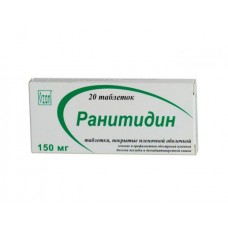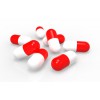Expiration date: 12/2026
The composition and form of issue:
Tablets, film-coated. 1 tablet contains:
ranitidine (as hydrochloride) 150 or 300 mg
Pharmacological action:
Blocks histamine H2-receptors, decreases acid secretion and pepsin activity.
Indications:
Ulcers disease stomach and duodenal ulcers, zollingerellison syndrome, reflux - esophagitis.
Contraindications:
Hypersensitivity, pregnancy, lactation.
Side effects:
Headache, dizziness, nausea, vomiting, constipation, diarrhea, arrhythmia, leukopenia, granulocytopenia, thrombocytopenia, increased serum creatinine and transaminases, alopecia, rash.
Method of application and dose:
Inside, regardless of meals, with liquid, squeezed small amount of liquid.
Ulcers disease stomach and duodenal ulcers: for the treatment of exacerbations of 150 mg 2 times a day (morning and night) or 300 mg at night if necessary — 300 mg 2 times per day. The duration of treatment is 4-8 weeks. For the prevention of exacerbations of 150 mg at night.
Ulcers associated with NSAIDs: 150 mg 2 times daily or 300 mg at night for 8 -12 weeks. Prevent ulcers when taking NSAID — 150 mg 2 times a day.
Postoperative ulcers: 150 mg 2 times a day for 4-8 weeks.
Gastroesophageal reflux disease: 150 mg 2 times daily or 300 mg at night. If necessary, the dose may be increased to 150 mg 4 times a day. The course of treatment is 8-12 weeks.
Syndrome zollingerellison: the initial dose is 150 mg 3 times a day, if necessary dose can be increased.
Prevention of recurrent bleeding: 150 mg 2 times a day.
Prevention of Mendelson's syndrome: 150 mg dose 2 h before anaesthesia, and preferably 150 mg the previous evening.
Patients with renal insufficiency with Cl creatinine <50 ml/min the recommended dose is 150 mg/day.
Precautions:
Before treatment should be deleted malignant processes in the gastrointestinal tract. Be wary appointed to the human liver.




